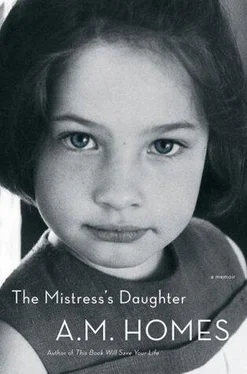Over the next few months, we meet several more times. We meet in hotels. We meet at Holiday Inns, Marriotts, Comfort Inns, Renaissance Quarters, in the odd spaces that are between spaces, the there that is never there.
We meet in the lobby, awkwardly kiss hello, and then move to the glass atrium, or the inner courtyard, or the café, looking up at a surround of numbered doors, housekeeping carts making their rounds. We come from the outside and are plunged into a temperature-controlled environment where the potted plants are watered automatically, where they are rotated seasonally like crops, where everything is suspended in time — hermetically sealed.
Ever since Norman’s comment about my clothing, I worry about what I am wearing, how I look. I continually feel that I am being evaluated. I want his approval. There is something about him that I like — the bigness of him; he is grandiose, larger than life. Sometimes it scares me; sometimes it lures me into another world, a world of men.
There is something sleazy about it, meeting in the middle of the afternoon in these middle-of-the-road hotels. Does he think that these are safe places where no one will see us? Does he have something in mind? It is never clear to me why we are meeting in them.
“You don’t know what it does to me to look at you,” he says.
He doesn’t mean, The resemblance is amazing, or, I’m so proud of what you’ve done with your life.
“You don’t know what it does to me to look at you.” He says it in a strange way. He is looking at me and seeing someone else.
He never does anything to push it further but I am always thinking that he will. I imagine him saying, I’ve got a room, I want to see you naked. I imagine undressing as part of the procedure of proving who I am, part of the degradation.
I imagine him fucking me.
I imagine being Ellen and him fucking her thirty-one years ago.
I imagine something profoundly sad.
It is the strangest set of imaginings and I can tell he has them too.
I have read about this; it is not unusual for the primal experiences of parent and child to morph — the intensity, the intimacy of the sensations is often expressed in adults as sexual attraction. But while the attraction may be common, almost expected, obviously it cannot be explored.
He makes no mention of the blood test — the results can take eight to twelve weeks. He makes no mention of telling his other children about me. Instead he tells me about how fond he is of his grandchildren. He tells me how close he was to his grandmother. And again he tells me how Coach always used to tell him to stay in the game — never get out of the game.
He asks me if I’ve spoken with her.
“Yes,” I say. “Have you?”
He nods, yes.
“She wants to visit me,” I tell him. “She sends letters with fantasies about going to the Central Park Zoo, for walks by the ocean, out to dinner. She has no idea of how strange this is for me. And she’s unrelenting — she could take over my life, she could swallow me whole.”
He smiles. “She’s a stubborn lady.”
“She wants to know when the three of us can have dinner together.”
He says nothing.
“Maybe you two should have dinner sometime?”
Norman blushes. “I don’t think so.” He shakes his head as if to say, You know what would happen. If he so much as saw her again, they would be back at it. He is still afraid of the power she has over him. I have the sense that he has promised himself or, more, that he has promised his wife that he won’t see her. A lot more has happened than I’ll ever know.
He shifts in his chair. He is always uncomfortable.
“Old injuries,” he says, “from the war, from football. I can’t sit still for very long.”
There is a pause.
“My wife is jealous of you,” he says.
On the rare occasions when I call Norman and his wife answers the phone, she never acknowledges who I am, never asks how I am, never says anything beyond, “Hold the line,” and then goes off in search of him.
There are times when I’m tempted to say something, something simple, like, “And how are you?” or, “I’m sorry for all the trouble,” but then I remember that it is not my responsibility. I can’t do all the work.
“Hold the line.”
Ellen thinks I’m her mother, Norman thinks I am Ellen, and I feel like Norman’s wife thinks I am the mistress reincarnate.
In September of 1993, I am in a suburban Maryland emergency room with my grandmother, who has fallen and broken her hip. I’m checking messages while waiting for the radiologist to read her X-rays. Norman has left a message.
By the time I get back to my parents’ house, it’s late. I return the call. Norman answers the phone.
“How are you?” he asks.
I tell him about my grandmother.
“I have some information for you,” he says.
I say nothing. I am not in the mood for games.
“The test results,” he says.
“Do you want to tell me something?” I ask.
“Should we meet at the hotel?”
“Which hotel?”
“The one in Rockville.”
“Sure,” I say. “But why don’t you just tell me what the results are?”
“Everything is fine,” he says.
“What does that mean?”
“Everything is fine. We’ll talk when I see you. Tomorrow at four?”
Everything is not fine. My patience is running thin. All of this is a game, a game that Ellen and Norman are playing, and I’m the object in the middle, the thing tossed back and forth. He’s making it worse, throwing in a night of suspense, leaving me to stay up late, wondering. More than wondering if he is or isn’t my father, I wonder why I keep going back for more. I will never know the whole story. There is an enormous amount that no one is telling me.
I meet him at the hotel. We are in the fern bar, the glassy atrium — the scene is like something from a science-fiction movie, a futuristic bioenvironment, the lunchroom in a space lab.
“I have the results of the DNA test,” he says.
“Yes.”
The waitress arrives and takes our order. I want nothing.
“I’m fine,” I tell her.
“Not even some tea?” Norman asks.
“Not even tea,” I say.
“Water?” the waitress asks.
“No.”
Norman waits until his ginger ale arrives before he says anything.
“The test says it’s ninety-nine-point-nine percent likely that I’m your father.” There is a pause. “So what are my responsibilities?”
I am not a slice of pie.
“So what are my responsibilities?”
I say nothing.
Norman doesn’t mention his children, or how he is going to take me into his family, or give me the large gift behind Door Number Three. He sips his drink and stares at me.
“Now that I’m your father, I think I have the right to ask — are you dating anyone?”
“No.” I am unsure whether I am answering the question or refusing to answer.
“Have you told your children?” I ask.
“No, not yet,” he says.
I’m wondering if he meets his other children for tea in cheap hotels.
We leave without saying good-bye, without a plan for what happens next.
In October I am in Washington to give a reading. Norman finds out and leaves a message. “Fine thing,” he says. “You’re in town? Would you like to meet?”
I call him back. “Hold the line,” his wife says.
“Imagine that,” Norman says, picking up. “You and my daughter in the same newspaper on the same day.”
I have no idea what he’s talking about.
“In the Gazette there are pictures of you and my daughter. Isn’t that something?” He sounds oddly proud, two of his children in the pages of the local paper.
“You and my daughter…”
Читать дальше












